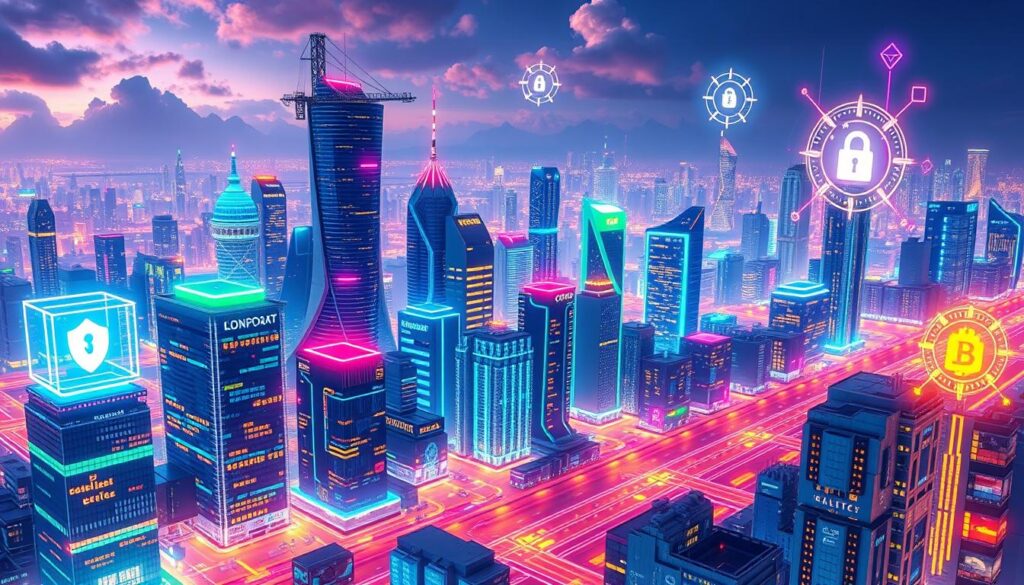Are you ready to explore the exciting world of blockchain technology? Becoming a blockchain developer is a great choice. The demand for these experts is rising fast. But, what skills do you need to succeed in this field? This guide will help you understand blockchain development and start your career.
A futuristic cityscape with interconnected digital blocks representing blockchain nodes, glowing lines symbolizing data flow, and vibrant colors reflecting the dynamic nature of technology, set against a starry night sky.
Key Takeaways
- Blockchain technology is changing the digital world, making it more popular. This means more jobs for blockchain developers.
- It’s important to know the basics of blockchain. This includes its concepts, terms, and how it’s used in real life.
- Blockchain developers can focus on core development or software. Each area needs different skills and tasks.
- To be a blockchain developer, you need a strong education in computer science or math. You also need to learn programming and cryptography.
- Blockchain developers can earn a lot. Senior roles can make over $100,000 a year, making it a rewarding career.
Table of Contents
What is Blockchain Technology?
Blockchain technology is a digital ledger that records transactions across many computers. It’s different from traditional databases because it’s hard to change the data. This makes it a secure way to record transactions and track digital assets.
Understanding the Fundamentals of Blockchain
A blockchain is a digital ledger of all cryptocurrency transactions. It’s a decentralized network, not controlled by any single entity. This technology lets businesses make secure transactions without needing third parties.
Network nodes verify transactions and record them in a public ledger called a blockchain.
The key features of blockchain technology include:
- Decentralization: Blockchain networks are decentralized, eliminating the need for a central authority to oversee or manage the system.
- Transparency: All transactions are recorded in a public ledger, making the system transparent and traceable.
- Immutability: Once a transaction is recorded, it cannot be altered or deleted, ensuring the integrity of the data.
- Security: Blockchain uses cryptographic hash functions to secure the network, making it extremely difficult to tamper with the data.
Blockchain technology has the potential to disrupt various industries. It can change finance, supply chain management, healthcare, and real estate. It enables the development of decentralized applications (dApps), cryptocurrencies, and other innovative solutions.
| Blockchain Key Features | Description |
|---|---|
| Decentralization | Blockchain networks are decentralized, eliminating the need for a central authority to oversee or manage the system. |
| Transparency | All transactions are recorded in a public ledger, making the system transparent and traceable. |
| Immutability | Once a transaction is recorded, it cannot be altered or deleted, ensuring the integrity of the data. |
| Security | Blockchain uses cryptographic hash functions to secure the network, making it extremely difficult to tamper with the data. |
“Blockchain is a technology that will fundamentally change the world.”
– Bill Gates, Co-founder of Microsoft
What Does a Blockchain Developer Do?
Blockchain developers are key in shaping the future of decentralized tech. They design, develop, and implement blockchain protocols, smart contracts, and decentralized apps (dApps). These projects use blockchain technology.
There are two main types of blockchain developers. Core Blockchain Developers focus on the security and architecture of blockchain systems. They lay the groundwork for others. Blockchain Software Developers build apps on existing blockchain platforms. They handle design, front-end, back-end, and maintenance.
Blockchain developers have many responsibilities:
- Designing blockchain protocols and network architecture
- Developing backend systems according to blockchain protocols
- Creating front-end designs and user interfaces for decentralized applications
- Developing and monitoring smart contracts
- Ensuring the security and scalability of blockchain-based solutions
- Collaborating with cross-functional teams to integrate blockchain technology into various industries
| Key Responsibilities | Core Blockchain Developers | Blockchain Software Developers |
|---|---|---|
| Blockchain Architecture | Responsible for designing the security and architecture of the blockchain system | Build applications on top of existing blockchain platforms |
| Development | Create the foundation and protocols of the blockchain network | Develop front-end and back-end for decentralized applications |
| Smart Contracts | Develop and maintain complex smart contracts | Integrate and deploy smart contracts into decentralized applications |
| Scalability and Security | Ensure the overall security and scalability of the blockchain system | Optimize decentralized applications for performance and security |
Blockchain developers need to know a lot about blockchain, cryptography, and programming. They should be skilled in languages like Solidity, Java, and Python. They also need to keep up with blockchain trends to create innovative solutions.
The Benefits of Becoming a Blockchain Developer
The blockchain technology market is expected to hit $69 billion by 2030. This growth has led to a huge demand for blockchain developers. In India, the number of blockchain developer jobs has skyrocketed, making it a top skill set.
Being a blockchain developer comes with many perks. You get to work with cutting-edge tech and join a booming industry. This makes you a strong candidate, as companies look for blockchain experts.
Blockchain developer salaries in India are also attractive. According to SalaryExpert, the average salary is ₹24,60,801 per year, with bonuses around ₹1,14,887. Salaries range from ₹17,53,512 for beginners to ₹31,00,413 for experienced developers.
| Blockchain Developer Salary in India | Average Base Salary | Average Bonus |
|---|---|---|
| Entry-Level | ₹17,53,512 | – |
| Mid-Level | ₹24,60,801 | ₹1,14,887 |
| Senior-Level | ₹31,00,413 | – |
With the blockchain market booming and a high demand for developers, now is a great time to start a career in this field. By keeping up with blockchain advancements, you can become a key player in any company using this technology.
The Two Types of Blockchain Developers
In the world of blockchain technology, there are two main types of developers: core blockchain developers and blockchain software developers. Each is crucial for the future of decentralized networks and apps.
Core Blockchain Developers
Core blockchain developers design the backbone of blockchain systems. They create the protocols, ensure security, and manage the network. They know a lot about blockchain architecture, cryptography, and how networks agree on data.
These experts build the foundation that makes blockchain networks work.
Blockchain Software Developers
Blockchain software developers work on apps and solutions on top of blockchain platforms. They handle everything from design to maintenance. They’re skilled in programming languages like Solidity and creating dapps for blockchain networks.
| Core Blockchain Developers | Blockchain Software Developers |
|---|---|
| Design blockchain protocols and security patterns | Build decentralized applications (dApps) on blockchain platforms |
| Manage and maintain blockchain networks | Develop front-end and back-end of blockchain-based applications |
| Expertise in blockchain architecture, cryptography, and consensus algorithms | Proficient in programming languages like Solidity, Truffle, and dApp development |
| Average U.S. salary: $154,550 | Average U.S. salary: $129,179 |
Blockchain networks come in four types: public, private, consortium, and hybrid. Public blockchains are open to everyone. Private ones are controlled by one entity. Consortium blockchains are managed by a group, and hybrid ones have some public oversight.
“The blockchain industry is still relatively young, resulting in a limited pool of experienced developers and a growing need to build up this talent pool over time.”
How to Become a Blockchain Developer
Educational Requirements and Essential Skills
To become a blockchain developer, you need a solid background in computer science or math. This usually means a Bachelor’s or Master’s degree. You also need to learn programming languages like Solidity, Python, and others.
It’s important to understand blockchain technology basics. This includes knowing about consensus mechanisms and blockchain architectures. Start by taking courses, getting certifications, and working on projects.
Knowing the blockchain development industry is key. It helps you find your niche. The demand for blockchain jobs has grown a lot, with a 118% increase in job ads on Indeed’s platform by mid-July 2021.
| Top Blockchain Occupations | Recommended Skills |
|---|---|
| Cryptocurrency Engineer | Solidity, C++, Java, JavaScript |
| Data Scientist | Python, SQL, Machine Learning |
| Full Stack Developer | JavaScript, React, Node.js, Solidity |
| Software Engineer – Generalist | C++, Java, Golang, Rust |
| Front End Developer | HTML, CSS, JavaScript, React |
| Junior Web Application Developer | HTML, CSS, JavaScript, Node.js |
The Blockchain OS by Cartesi lets developers use Python for smart contracts. This makes coding easier and more familiar.
Online certifications for blockchain development are quicker and cheaper. The Certified Blockchain Developer (CBD) by the Blockchain Council is a popular choice.
how to become a block chain developer
If you want to be a blockchain developer, start by learning about blockchain technology. You can take online courses or work on projects to understand it better. This will help you grasp the basics of blockchain.
Next, learn programming languages like Solidity and Python. Knowing data structures, databases, and cryptography is also key. It’s important to understand blockchain’s architecture and how it works.
Building a portfolio of blockchain projects is crucial. Joining the blockchain community and networking can boost your skills. This includes working on open-source projects and attending blockchain events.
Blockchain job ads have surged by 118% on Indeed since mid-July 2021. This shows a big demand for blockchain developers. Roles include core developers, software developers, and smart contract developers.
Getting online certifications, like the Certified Blockchain Developer (CBD), can help. These programs offer specialized education. They complement your hands-on experience and technical skills.
By following this roadmap, you can become a sought-after blockchain developer. You’ll play a key role in the growing blockchain industry.

A futuristic workspace featuring a blockchain developer, surrounded by multiple screens displaying code, digital ledgers, and blockchain networks. The setting is sleek and modern, with neon lights highlighting the technology. In the background, abstract representations of blockchain structures and cryptocurrency icons are artistically integrated into the environment. The developer is focused, with a thoughtful expression, immersed in their work amidst a sea of data visualizations and holographic interfaces.
| Skill | Description |
|---|---|
| Blockchain Fundamentals | Understanding the core concepts, principles, and architecture of blockchain technology |
| Programming Languages | Proficiency in languages like Solidity, Python, Go, and others used in blockchain development |
| Data Structures and Algorithms | Knowledge of data structures (graphs, binary search trees, linked lists, hash maps) and algorithms used in blockchain systems |
| Cryptography | Understanding of public-key cryptography, hash functions, and digital signatures |
| Decentralized Applications | Building and deploying decentralized applications (DApps) on blockchain platforms |
By mastering these skills and keeping up with blockchain trends, you’ll be a valuable asset. You’ll thrive in the fast-growing blockchain development field.
The Blockchain Development Industry
The blockchain development field is growing fast. It covers many areas and specializations. Developers can pick their path based on what they like and what they’re good at.
Popular areas include cryptocurrencies, DeFi, smart contracts, and more. You can focus on building blockchain networks or creating apps. This lets developers choose their niche.
Exploring Different Focus Areas and Specializations
To find your spot in blockchain, keep up with trends and follow leaders. There’s a lot to explore. The right skills can open many doors in this field.
| Focus Area | Specialization | Key Skills |
|---|---|---|
| Cryptocurrencies | Core Blockchain Development | Cryptography, consensus mechanisms, network architecture |
| DeFi | Blockchain Software Development | Smart contract programming, decentralized application design |
| Supply Chain Management | Blockchain Consulting | Business analysis, regulatory compliance, project management |
| Healthcare | Blockchain Quality Engineering | Security testing, interoperability, performance optimization |
By looking into different specializations, you can find a fulfilling career. Match your interests and skills to your path in blockchain.
Blockchain Use Cases and Applications
Blockchain technology is changing many industries. It offers practical uses in finance, supply chain, healthcare, and more. It’s making business and data management better.
Blockchain in the Financial Sector
The financial world was quick to use blockchain. Cryptocurrencies and DeFi are leading the way. They make transactions safe, open, and without middlemen.
DeFi apps on blockchain offer new financial services. These include lending, borrowing, and trading, all without banks.
Blockchain in Supply Chain Management
Blockchain is also changing supply chains. It makes them more transparent, traceable, and secure. This helps lower costs and makes global trade more efficient.
Blockchain solutions digitize and secure documents. They also track goods and assets in the supply chain.
Blockchain in Healthcare
In healthcare, blockchain is being used to manage data and track medical supplies. It keeps patient data safe and allows for sharing among healthcare providers. This improves patient care and medical research.
Blockchain in Other Industries
Blockchain is also used in real estate, insurance, media, and the public sector. It brings transparency, efficiency, and cost savings. This opens up new business models.
As blockchain use grows, it’s changing many industries. It makes things more secure, open, and efficient. Blockchain is key to the digital future.
| Industry | Blockchain Use Cases | Benefits |
|---|---|---|
| Finance | CryptocurrenciesDecentralized Finance (DeFi) | Secure and transparent transactionsReduced need for intermediariesInnovative financial services |
| Supply Chain Management | Asset trackingSupply chain transparencyDocument digitization and tokenization | Improved efficiency and traceabilityReduced costsEnhanced global trade |
| Healthcare | Secure data managementMedical supply trackingCollaborative research | Improved data security and privacyEnhanced patient careAccelerated medical discoveries |
Blockchain’s versatility is clear in its many uses. As it’s adopted more, we’ll see even more changes.

A futuristic cityscape showcasing various blockchain technology applications, featuring elements like decentralized finance (DeFi) platforms, supply chain tracking, digital identity verification, and smart contracts, all interconnected through a glowing blockchain network, with vibrant colors and dynamic shapes representing data flow and security.
“Blockchain technology is not just a disruptive force, but a transformative one, with the potential to reshape the way we conduct business, manage data, and interact with one another in the digital age.” – Industry Expert
Programming Languages for Blockchain Development
Blockchain development needs skills in many programming languages. Each has its own strengths and uses. For example, Solidity is key for smart contracts on Ethereum. Meanwhile, Python is great for building blockchain apps.
Mastering Solidity, Python, and Other Essential Languages
Solidity is a must for smart contracts and dApps on Ethereum. Its C-like syntax and EVM compatibility make it essential. Python, however, is more general-purpose. It’s popular for data analysis and prototyping.
Other important languages include JavaScript, Rust, and Go. JavaScript is widely used and web-friendly. Rust focuses on performance and security. Go is known for its concurrency and scalability.
Knowing blockchain-specific tools like Truffle, Ganache, and Hardhat is also crucial. These tools help with Ethereum development. For enterprise blockchain, Hyperledger Fabric is key. Mastering these languages and tools is vital for a blockchain developer’s success.
| Programming Language | Key Features | Popular Blockchain Projects |
|---|---|---|
| Solidity | Contract-oriented, C-like syntax, EVM compatibility | Ethereum, Polygon, Binance Smart Chain |
| Python | Versatile, easy-to-learn, extensive library ecosystem | Ethereum, Hyperledger Fabric, Corda |
| JavaScript | Widely adopted, web integration, event-driven | Ethereum, Hyperledger Fabric, EOS |
| Rust | Emphasis on performance, security, and concurrency | Ethereum, Polkadot, Solana |
| Go | Scalable, flexible, and efficient | Ethereum, Hyperledger Fabric, Cosmos |
The blockchain industry is growing fast. This means more jobs for skilled developers. Learning these languages and tools can open many doors in this exciting field.
Building a Blockchain Development Portfolio
As a blockchain developer, having a strong portfolio is key. It shows your skills and experience to employers. You can do this through online courses, hackathons, coding challenges, and personal projects.
Showing your skills by making dApps, smart contracts, or helping open-source projects is smart. Document your projects and talk about the challenges and how you solved them. This proves you know your stuff.
Also, getting involved in the blockchain community helps. Write blogs, speak at events, or help with open-source projects. It shows you’re knowledgeable and can work well with others.
| Blockchain Development Portfolio Strategies | Benefits |
|---|---|
| Complete online blockchain development courses | Demonstrate your commitment to continuous learning and acquire essential skills |
| Participate in blockchain-related hackathons or coding challenges | Showcase your problem-solving abilities and hands-on experience in real-world scenarios |
| Develop your own blockchain projects, such as dApps or smart contracts | Illustrate your technical expertise and the ability to apply blockchain concepts to practical use cases |
| Contribute to open-source blockchain projects | Demonstrate your commitment to the blockchain community and your ability to collaborate with others |
| Write blog posts or speak at blockchain industry events | Enhance your visibility and credibility as a blockchain expert within the community |
By working on and sharing your blockchain developer portfolio, you show your blockchain development experience and blockchain projects. This can help you get a job in the fast-growing blockchain field.
Conclusion
Becoming a blockchain developer is a promising career choice. The blockchain technology market is set to grow a lot in the next few years. To succeed, you need to learn the technical skills and understand blockchain basics.
Building a portfolio of blockchain projects is also key. This way, you can stand out in the fast-growing industry.
Blockchain developers are in high demand. They get good pay and have chances to innovate. This makes it a great career for those who love new technology.
As blockchain changes many industries, the need for skilled developers will grow. This opens up many opportunities for those who are ready to learn and grow.
With resources like Cyfrin Updraft, you can start a rewarding career in blockchain development. Stay committed to learning and keep up with trends. This way, you can lead in this exciting field.
FAQ
What is Blockchain Technology?
Blockchain is a digital ledger that records all cryptocurrency transactions. It’s different from traditional methods because it’s not controlled by governments or groups. This technology lets businesses make secure transactions without needing third parties.
What Does a Blockchain Developer Do?
A blockchain developer creates apps and smart contracts using blockchain tech. They also understand the tech’s architecture and protocols. There are two main types: Core Blockchain Developers and Blockchain Software Developers.
What are the Benefits of Becoming a Blockchain Developer?
Blockchain developers have a lot of job opportunities because of the exciting tech. The Times of India says blockchain jobs in India have grown a lot. They also earn good salaries, with an average of ₹24,60,801 per year in India.
What are the Two Types of Blockchain Developers?
There are two main types of blockchain developers. Core Blockchain Developers work on the tech’s architecture and security. Blockchain Software Developers build apps on existing platforms.
What are the Educational Requirements and Essential Skills for Becoming a Blockchain Developer?
To be a blockchain developer, you need a degree in computer science or math. You also need to learn programming languages like Solidity and Python. Knowing blockchain basics is crucial too.
What are the Different Focus Areas and Specializations in Blockchain Development?
Blockchain development covers many areas, like cryptocurrencies and smart contracts. Developers can focus on core development or building apps. There’s also a focus on supply chain management and healthcare.
What are the Key Programming Languages and Tools for Blockchain Development?
You need to know languages like Solidity and Python for blockchain development. Familiarity with tools like Truffle and Hyperledger Fabric is also important.
How Can Aspiring Blockchain Developers Build a Strong Portfolio?
A strong portfolio is key for aspiring developers. It can include online courses and personal projects. Contributing to the blockchain community can also boost your credibility.
Source Links
- How to Become a Blockchain Developer | Must Have Skills
- What Is a Blockchain Developer (and How Do I Become One)?
- How To Become A Blockchain Developer Step-by-Step | Dapp University
- How to become a blockchain developer in 2024: A guide to getting started | Algorand
- How to Become a Blockchain Developer? – GeeksforGeeks
- How to Become a Blockchain Developer? [UPDATED] – Blockchain Council
- How to become a Blockchain Developer?
- Blockchain Developer – Career, Role, Education, Jobs & Salary
- Top 6 Essential Skills and Career Pathways for Blockchain Developers
- 7 must-have blockchain developer skills
- Blockchain Development: The Complete Guide
- How to Become a Blockchain Developer from Scratch in 2022.
- How to Become Blockchain Developer?
- 16 Blockchain Applications and Real-World Use Cases 2024 | Built In
- Blockchain Use Cases and Applications by Industry
- Top 15 programming languages for Blockchain app development
- Top 10 Programming Languages for Blockchain App Development | Simplilearn
- 9 Best Programming Languages for Blockchain Development
- The authoritative guide to blockchain development
- How to Become a Blockchain Developer & Get Hired | Zero To Mastery
- How to Become a Blockchain Developer in 2024 Step-By-Step | Top Skills
- Blockchain Developer Roadmap – The Full Guide
- A Roadmap to Become a Blockchain Developer in 2024
- Top 5 Skills Required To Become A Blockchain Developer – Magnimind Academy








